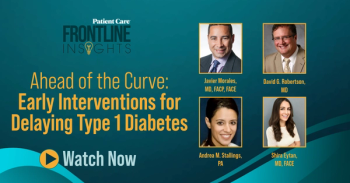Ahead of the Curve: Early Interventions for Delaying Type 1 Diabetes

EP. 1: Assessing the Burden of Type 1 Diabetes
ByJavier Morales, MD, FACP, FACE ,David Robertson, MD,Andrea Stallings, PA,Shira Eytan, MD, FACE Panelists discuss how Type 1 diabetes imposes significant physical, emotional, and financial burdens on patients through the lifelong need for insulin therapy, blood glucose monitoring, lifestyle modifications, and management of potential complications.

EP. 2: Guidelines for Type 1 Diabetes Screening
ByJavier Morales, MD, FACP, FACE ,David Robertson, MD,Andrea Stallings, PA,Shira Eytan, MD, FACE Panelists discuss how screening for Type 1 diabetes should focus on identifying high-risk individuals through family history, genetic markers, and autoantibody testing, while emphasizing the importance of early detection to prevent diabetic ketoacidosis at diagnosis.

EP. 3: Defining the Stages of Type 1 Diabetes
ByJavier Morales, MD, FACP, FACE ,David Robertson, MD,Andrea Stallings, PA,Shira Eytan, MD, FACE Panelists discuss how Type 1 diabetes progresses through distinct stages, from initial autoimmunity with normal blood glucose (Stage 1), to dysglycemia without symptoms (Stage 2), to clinical diagnosis with symptoms (Stage 3), marking critical intervention points for treatment and management.

EP. 4: Impact of Delayed Intervention In Stage 2 Type 1 Diabetes
ByJavier Morales, MD, FACP, FACE ,David Robertson, MD,Andrea Stallings, PA,Shira Eytan, MD, FACE Panelists discuss how delaying intervention during Stage 2 Type 1 diabetes increases the risk of diabetic ketoacidosis and complications at diagnosis, while also potentially accelerating beta cell destruction and reducing the window for preservation therapies.

EP. 5: Screening for Autoantibodies in Type 1 Diabetes
ByJavier Morales, MD, FACP, FACE ,David Robertson, MD,Andrea Stallings, PA,Shira Eytan, MD, FACE Panelists discuss how screening for autoantibodies can help identify individuals at risk for type 1 diabetes before symptoms develop, enabling earlier intervention and potentially delaying disease onset.

EP. 6: Mechanism of Action of Teplizumab in Delaying Onset and Progression of Type 1
ByJavier Morales, MD, FACP, FACE ,David Robertson, MD,Andrea Stallings, PA,Shira Eytan, MD, FACE Panelists discuss how teplizumab binds to T cells and modifies their function to preserve beta cell function, potentially delaying type 1 diabetes onset in at-risk individuals by an average of 2-3 years.

EP. 7: Clinical Trial Data for Teplizumab
ByJavier Morales, MD, FACP, FACE ,David Robertson, MD,Andrea Stallings, PA,Shira Eytan, MD, FACE Panelists discuss how teplizumab demonstrated efficacy in clinical trials by delaying type 1 diabetes onset in high-risk patients.

EP. 8: Patient Selection for Teplizumab and Infusion Process
ByJavier Morales, MD, FACP, FACE ,David Robertson, MD,Andrea Stallings, PA,Shira Eytan, MD, FACE Panelists discuss how patient selection for teplizumab therapy requires careful screening for autoantibody positivity and preserved C-peptide function, followed by a 14-day outpatient infusion process that needs close monitoring for cytokine release syndrome and other potential adverse effects.


